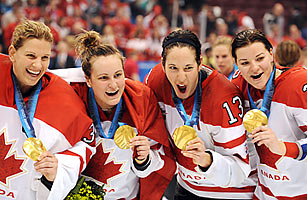
Members of the Canadian women's ice hockey team show off their gold medals at the Vancouver 2010 Olympics
(2 of 2)
Even before the hockey controversy, the IOC had clearly shown that gender equality is not its strength. Women already can't ski jump in the Olympics, which shuts them out of two events: ski jumping and the Nordic combined. There's no four-woman bobsled or doubles luge competitions. (Technically, doubles luge can be co-ed, but since heavier sleds travel faster, it's a de facto men's club.) If hockey were cut, female athletes would lose 168 spots in the Olympics, since there are eight teams, with 21 players on each roster, in the tournament.
Losing so many spots would be a public-relations disaster for the IOC. "What frustrates me is, you want to see U.S.A. go out, kick some serious butt and put the pressure on the other countries to step it up," says Mendoza, who is now president of the Women's Sports Foundation and is in Vancouver doing blog reports for Yahoo! Sports. "It just reminds me of softball, and I started thinking to myself, I bet you people are saying, 'Why are you beating people so much? It hurts the sport.' It almost brings tears to my eyes. Isn't this what the Olympics is all about? You work your butt off, you go out, and you dominate."
What steps must other countries take to catch the U.S. and Canada? The biggest discrepancy between North America and the rest of the field is resources. In reaction to Rogge's comments, Swedish coach Peter Elander said the budgets of the North American teams are "eight times" higher than Sweden's and that the U.S. and Canada spend twice as much time training together. "Why isn't the Czech Republic here with a team?" asks Ouellette, the Canadian player. "They have such a good team on the men's side, but they don't have a women's team." Ouellette cites Russia as another disappointment. She coached a player from the country during her two years as an assistant at the University of Minnesota Duluth. "They have nothing," she says. "Right now, all the funding goes to the men's side."
IOC member Richard Pound, a Canadian, notes that in the early days of the men's hockey tournament, only a few teams were any good. Canada, for example, won six of the first seven gold medals awarded from 1920 through 1952. "You've got to get these teams together playing," Pound says of the women. "You know, it's easy for us in Canada and the States — we're right next door, teaching each other how to play." Pound preaches patience: "The levels will rise. It will come."
Wishful thinking, perhaps? Players and officials insist that the teams outside North America have improved — though it's hard to seriously believe that a team like Slovakia, which lost 18-0, is making positive strides. "They're getting better," says Ouellette. "But so are we. So instead of the gap shrinking, it stays the same."
Ouellette dreads confronting a day when women's hockey leaves the Olympics. "It would be so sad," she says. "We train so hard. We'd be the first ones to love to have more close games here, but it's not like that right now. We can only control what we do." And being too good may cost her.